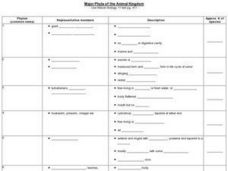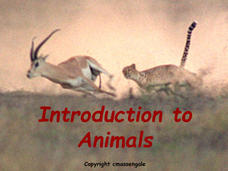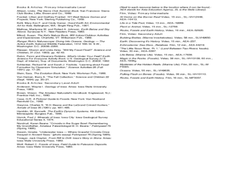Curated OER
Fish Parasite Survey
Students survey and dissect as many fish as possible. They count nematodes, cestodes and crustaceans on the fish, fill out autopsy reports, and transfer data to a chalkboard data table. Students graph the results of the entire class...
Curated OER
Biodiversity
In this biodiversity learning exercise, students sort and classify animals by their observable features using a dichotomous key. Students then respond to questions about complete and incomplete metamorphosis.
Curated OER
Watch the Screen!
Students explore screening processes for biological activity. In this deep sea lesson plan students complete a lab activity.
Curated OER
Eyewitness Insect Video Quiz
In this insect worksheet, learners answer 12 multiple choice questions after watching a video about insects. Topics include structures of insects, characteristics of insects, termites, crickets and beetles and the process of metamorphosis.
Curated OER
Biology Trivia
In this biology trivia instructional activity, students write short answers to 101 questions about animal classification, human anatomy, animal facts, and attributes of organisms.
Curated OER
Oceanography: Ocean Market
Sstudents identify consumer goods obtained from the oceans. They classify the items and calculate the cost of buying these goods. After taking a simulated sea shopping spree, they tally the cost of the items purchased. They conclude the...
Curated OER
Research Project
Learners learn the characteristics of arachnids by researching the arachnid of their choice and producing a 4 to 5 paragraph research paper.
Curated OER
Major Phyla of the Animal Kingdom
In this animal kingdom worksheet, students compare and contrast the 10 different phyla including the description and approximate number of species found in each one. This worksheet is a graphic organizer.
NOAA
What Killed the Seeds?
Can a coral cure cancer? Take seventh and eighth grade science sleuths to the underwater drugstore for an investigation into emerging pharmaceutical research. The fifth installment in a series of six has classmates research the wealth of...
Biology Junction
Dissection of the Clam
Is the structure of a clam really as simple as it seems? Young scholars explore the anatomy of the clam in an engaging lesson presentation. The lesson highlights the digestive process of the clam as well as how it moves and what it does...
Biology Junction
Introduction to Animals
Out of all animals, elephants alone lack the ability to jump. Scholars learn all about animals using a presentation full of fun examples. It describes different types of animals, the biological similarities and differences between...
Curated OER
Art: Go Ahead and Bug Me!
Pupils research arthropods, and identify the differences between vertebrates and invertebrates. After comparing and contrasting insects and arachnids, they create drawing of them that are anatomically correct. Students place their...
Habits of Mind
Haileybury Habits of Mind Learning Resource Book
Imagine a learning community committed to using Costa and Kallick's Habits of Mind as the basis of curriculum design. The resource book is packed with lessons that are designed for and identify the standards and habits of mind targeted...
Curated OER
Mountains in the Sea Exploration No Escape
Pupils study data to hypothesis about the influence of a water circulation cell on the retention of benthic invertebrate larvae in the area of a seamount. They investigate the positives and negatives of larvae retention in this series of...
Curated OER
Living by the Code
Students explain why new drugs are needed to treat cardiovascular disease, cancer, inflammation, and infections. They infer why some marine invertebrates are promising sources of new drugs, explaining the process in which cells...
Curated OER
Blue Planet: Seasonal Seas
Students study and research marine invertebrates. In this marine lesson students create an illustrated report and help complete a class exhibit.
Curated OER
Backyard Critters
Students explore the characteristics of invertebrates in their backyards. They observe, describe, and classify specimens. They conclude with a "snail race."
Curated OER
Vertebrates
Students identify and describe five main groups of the Phylum Chordata. They discover that the Phylum Chordata is the vertebrates. Students identify the main difference between invertebrates and vertebrates. They read passages about...
Curated OER
Animal Classification
Third graders differentiate between vertebrates and invertebrates, and identify the main characteristics of mammals, fish, reptiles, amphibians, and birds. They sort and categorize different types of balls, discuss the characteristics...
Curated OER
Plankton of Tyson Lagoon
In this plankton key worksheet, students use drawings of phytoplankton and zooplankton to identify macro- invertebrates, diatoms and algae from a pond water sample.
Curated OER
Crinoids: Flowers f the Iowa Seas
Learners study the rocks and fossils associated with the geologic landscape of Iowa. In this rocks and fossils instructional activity, students examine fossils that would be found in the Iowa landscape that show evidence of marine...
Curated OER
Three Dimensional Art of Vertebrates and Invertebrates
Young scholars, during this twelve week series of lessons, learn basic anatomy through life sketches of human skeletons and shells. They learn fundamentals of line and convey life through sketches learning science through art.
Curated OER
Invertebrates
Students identify insect body parts and look for local insect life. They create an insect using recycled material and design a classroom mural with bug facts. They study Monarch butterflies and dragonflies.
Curated OER
Who Am I?
In this science worksheet, students examine 16 detailed pictures of different species of marine invertebrates. Students identify each species. There is no room to write the name under the picture. It is assumed this is an oral activity,...
Other popular searches
- Invertebrates and Vertebrates
- Marine Invertebrates
- Invertebrate Worksheets
- Invertebrates Vertebrates
- Vertebrates an Invertebrates
- Vertebrate and Invertebrates
- Benthic Invertebrates
- Invertebrates Research
- Invertebrates + Vertebrates
- Invertebrate Phylum
- Invertebrate Classification
- Invertebrate Sponge

























